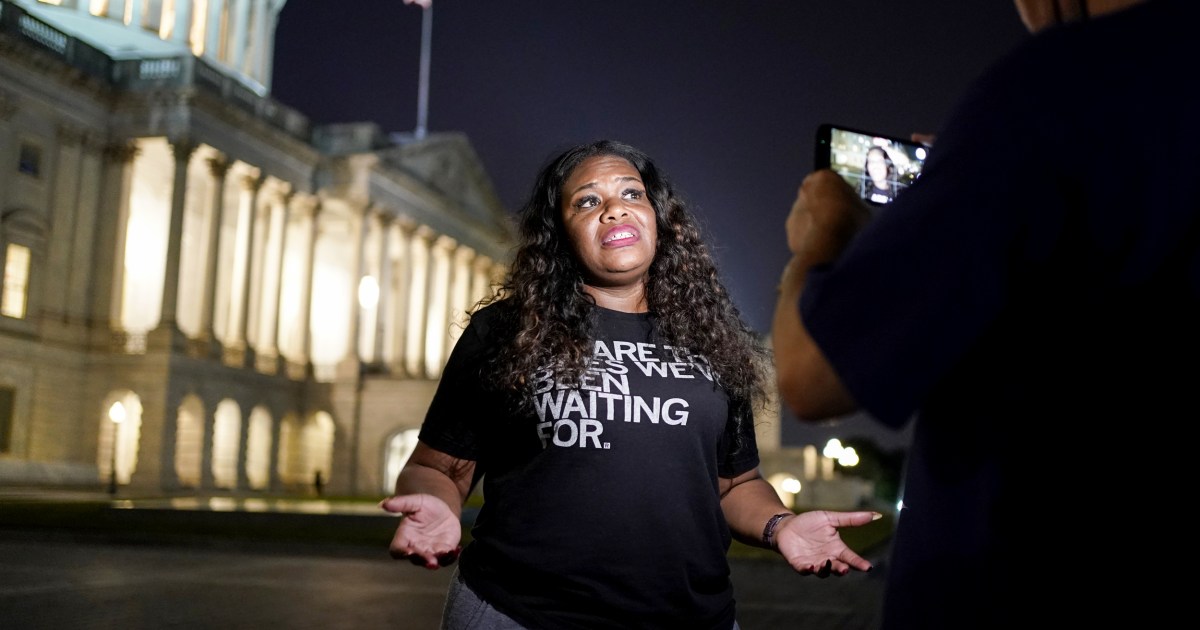
WASHINGTON — Rep. Cori Bush spent three nights and three days on the steps of the U.S. Capitol, scoring a victory that may prove to be short-lived but that fellow progressives are hoping to turn into future wins.
In a Washington that has struggled to function, split not just along partisan lines but across a spectrum that has divided politicians into ever-shrinking silos, getting anything accomplished can often feel impossible.
But Bush, a Democrat from Missouri, tasted momentary victory this week when the White House relented and re-established the eviction moratorium. And progressives are using their newfound victory to push other issues, including the canceling of student debt. (On Friday, the administration announced another payment hiatus extension.)
Democrats heaped praise on Bush.
“I used to ask myself, ‘Does it matter that I’m here instead of somebody else?’ And you’ve now answered that question. It matters that you’re here, and not somebody else,” Sen. Elizabeth Warren, D-Mass., said.
Rich Luchette, a Democratic consultant and former congressional aide, said that Bush’s tactic was effective. He compared it to the sit-in on the House floor led by Rep. John Lewis over gun control after the Pulse nightclub shooting in Orlando.
“She found an innovative way to draw attention to an issue that has not been tried before,” Luchette said, noting that a sit-in had never been conducted in a chamber of Congress before Lewis did it in 2016. “I think it’s clear that protests can be an effective tactic.”
But it might not work forever. The eviction moratorium could last only days. And it’s a tactic that may not be successful again. But even those whom she was working against offered congratulations.
“Thank you for your mobilizing. For making the issue better known so that’s, that’s part of our system so I thank her,” House Speaker Nancy Pelosi said.
An attempt at legislating
Bush had been homeless before she entered politics, and she knew firsthand what millions of Americans were facing. But she had been in Washington for just eight months, and like most freshman lawmakers, has little political capital.
She had immediately bonded with the original members of the “Squad” — six high-profile progressive women members — but her influence inside the corridors of power was limited. Like most people new to the job, she lacked understanding of the complex personal, political and strategic intricacies of passing legislation.
During her short time in Congress, Bush has tangled with fellow Democrats on multiple issues.
She supports defunding the police, a position her party’s leaders have rejected. She rankled fellow Democrats, including members of the Congressional Black Caucus, who say she didn’t warn them about an amendment on the George Floyd police reform bill that would have given prisoners the right to vote.
Bush’s legislative knowledge was tested on July 30, when the House adjourned for its scheduled seven-week recess without extending the eviction moratorium.
Pelosi, House Whip Jim Clyburn and Financial Services Chairman Maxine Waters and been working all day to round up the votes to pass an extension until October 18. It was a Hail Mary that was unlikely to work given the dynamics in the Senate.
As the day dragged on, it became clear that sufficient Democratic support would not materialize.
Some Democrats didn’t want to vote so quickly on a bill they didn’t fully understand. Others said they were being lobbied by landlord constituents to oppose an extension. Some didn’t want to vote on a measure that would most likely be blocked in the Senate without the support of 10 Republicans.
Democratic leadership had a backup plan. They called for a unanimous consent vote — a way to say Democrats are in favor of something without having to take a roll call and expose internal divisions. Republicans would have blocked it. And then Democrats could have tried to point the blame across the aisle.
But Bush was furious about the lack of a roll call vote. She met Rep. Alexandria Ocasio Cortez, D-N.Y., in the Women’s Caucus Reading Room off the House floor to strategize.
Bush tried to ask House floor staff to force a vote — a process she had never attempted — but it was too late, the House had already adjourned.
So instead, she turned to her activist roots.
Bush and Ocasio-Cortez broadcast an Instagram live to the New York Democrat’s 8.7 million followers. It launched a five-day marathon of sleeping on the Capitol steps, television interviews, planning with her colleagues, and attempting to influence decision-makers.
A switch to lobbying
By the third day, Bush was exhausted and physically sore from sleeping in a camp chair. But she was determined to stick it out.
She got word that Vice President Kamala Harris had a meeting in the Senate, and Bush went, uninvited, to see her.
At that moment, House Speaker Nancy Pelosi called her. It was the first time they had spoken since the House adjourned Friday night without passing an extension. Pelosi told Bush that she was doing a great job, but she wouldn’t reconvene the House to vote on a moratorium.
Pelosi, who confirmed talking with Bush by phone, says she told the congresswoman to stay hydrated but also that she wouldn’t call House members back. “We’re not calling members back,” she told her, adding that Bush needed to be focused on the White House. “I don’t go the floor and lose.”
Then Harris walked out of her office.
Bush walked up to her, looked her in the eyes, and asked, “How can you help me?” The vice president was noncommittal but thanked Bush for all the work she was doing drawing attention to evictions.
After the interaction, Bush was distraught, people close to her said.
The 30 minutes was pivotal for Bush, who had been using her activist instincts to try to bring change in a town that is rigid and often unresponsive to such tactics.
She left the Senate, feeling dejected. She had also been unable to meet with Schumer, and had had an unsatisfactory call with the speaker. She walked back to the Capitol steps.
Her staff told Pelosi’s staff they would like a unity message, and Bush was prepared to focus on pressuring the White House and CDC.
But then the tide began to turn.
Bush got word that Schumer was on his way outside to meet her on the Capitol steps. Then Pelosi’s office agreed to the unity message and the result was back-to-back messages urging the CDC to extend the moratorium.
“It was a perfect storm,” a senior Democratic aide said.
It took another night and day on the steps before the White House announced its new targeted guidelines for areas with high community transmission. The announcement came on the one-year anniversary of Bush’s defeat of 10-term Democratic U.S. Rep. Lacy Clay in the primary.
Waters said at the end of the day, the effort was about finding alternatives.
“And the alternative was, let’s put the pressure on the president and the CDC, which gave us an opportunity to say, “It is possible. We can get this done,” Waters said.
Source: | This article originally belongs to Nbcnews.com










